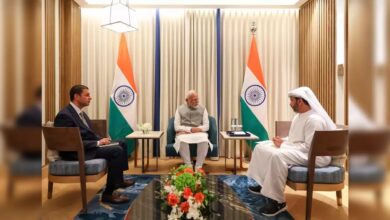According to EAM Jaishankar, “Quad reflects growth of multipolar order, post-cold war thinking.”
NEW DELHI: On Saturday, External Affairs Minister S Jaishankar said that the Quad group’s cooperation between India, the US, Australia, and Japan represents the rise of a multipolar system and encourages a post-Cold War strategy that challenges “spheres of influence.”

Speaking at the ‘Quad Think Tank Forum’ session at the Raisina Dialogue in the nation’s capital, Jaishankar listed five main points that the Quad was trying to get across.
These include a reflection of a multipolar order, a departure from Cold War and Alliance thought, resistance to spheres of influence, a statement of democratizing the global arena via cooperation, and a proclamation that decisions in the modern day cannot be dictated by others.
Jaishankar emphasized the importance of the Quad grouping in the Indo-Pacific area during the discussion, which was mainly focused on the Quad and a free and open Indo-Pacific. He clarified that American strategic interests at the time affected the partition of the Pacific and Indian oceans after 1945. The history and happenings of the Quad have bolstered these four countries’ cooperation in talking about a variety of complex challenges.
“The tsunami reaction is when the Quad got its start. This incident took place at the end of December 2004. As it happens, I am the Indian side’s organizer for that reaction. The concept of a Quad was first proposed by Japanese Prime Minister Shinzo Abe in 2006. However, as I previously said, everything fell apart in less than a year, and at that point, Abe had already resigned from office “Jaishankar stated.
“Quad was restarted in 2017 following a ten-year break, initially at the level of the Foreign Secretary and then elevated to the ministerial level in 2019.”
By coincidence, at that very moment, I am holding both positions. It has prospered since the four of us raised it to the pinnacle level in 2021. And I’ve had the honor of taking part in every meeting that has happened since then,” he said.
A constant topic throughout the session was the importance of the Quad serving the interests of all nations in the area, answering worries that its four members might see it as an exclusive alliance. The recent initiatives to increase the Quad’s interaction with other like-minded countries were also discussed.
Secretary of State Antony Blinken’s representative, US Deputy Secretary of State Kurt M. Campbell, spoke before EAM Jaishankar. Campbell emphasized the Quad’s prowess in combining the might and resources of the US, India, Australia, and Japan to produce concrete results that would benefit the Indo-Pacific area as a whole. He underlined the Quad’s commitment to a Free and Open Indo-Pacific (FOIP) and made it clear that, as opposed to pressuring strategic rivals to choose, the Quad seeks to strengthen the capabilities of friends and partners.
According to Campbell, the Quad is about maintaining and generating choices that let nations, institutions, and communities make decisions that are best for their people.
With virtual participation, Australian Foreign Minister Penny Wong emphasized the benefits of the Quad in the Indo-Pacific region. She underlined the ongoing momentum in delivering valued and transparent public goods that are sensitive to local concerns.
“I described the quad is a lighthouse, which brings together our countries to illuminate a positive vision for the Indo-Pacific,” she continued.
India’s premier geopolitical and geoeconomics forum, Raisina Dialogue is dedicated to tackling the most difficult problems the world community faces.







